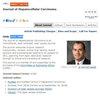甲胎蛋白在接受肝动脉灌注化疗联合来伐替尼和康瑞珠单抗治疗的不可切除肝细胞癌中的预后价值
IF 3.4
3区 医学
Q2 ONCOLOGY
引用次数: 0
摘要
目的:本研究旨在评估接受肝动脉灌注化疗(HAIC)联合来伐替尼和坎瑞珠单抗治疗的不可切除肝细胞癌(u-HCC)患者甲胎蛋白(AFP)反应的预后意义:对接受HAIC联合来伐替尼和坎瑞珠单抗治疗的u-HCC患者进行回顾性研究。4周内AFP下降20%为早期AFP反应,8周内AFP下降75%为AFP反应。研究调查了早期AFP反应、AFP反应、治疗反应、总生存期(OS)和无进展生存期(PFS)之间的相关性:研究共纳入 63 名患者。根据 RECIST v1.1 或 mRECIST 标准(45.5% 对 18.2%,P=0.014;81.8% 对 48.5%,P=0.013),AFP 反应者的客观反应率高于 AFP 无反应者。此外,与早期 AFP 无应答者相比,早期 AFP 有应答者的 OS(未达 8.0 个月 vs. 8.0 个月,p< 0.001)和 PFS(13.3 个月 vs. 3.0 个月,p= 0.018)均有所延长。同样,与AFP未应答者相比,AFP应答者的OS(未达到vs.9.0个月,p< 0.001)和PFS(19.3 vs. 5.1个月,p=0.002)均有所改善。多变量分析结果表明,早期 AFP 反应和 AFP 反应均可独立预测 OS [危险比(HR)2.963,95% 置信区间(CI)1.333- 6.585,p=0.008, and HR 6.182, 95% CI 1.780- 21.466, p=0.004] and PFS (HR 2.186, 95% CI 1.107- 4.318, p=0.024, and HR 3.078, 95% CI 1.407- 6.730, p=0.005),具有显著的预后价值:关键词:不可切除性肝细胞癌;甲胎蛋白;肝动脉灌注化疗;来伐替尼;康瑞珠单抗本文章由计算机程序翻译,如有差异,请以英文原文为准。
Prognostic Value of Alpha-Fetoprotein in Unresectable Hepatocellular Carcinoma Treated with Hepatic Artery Infusion Chemotherapy Combined with Lenvatinib and Camrelizumab
Purpose: This study aimed to assess the prognostic significance of alpha-fetoprotein (AFP) response in patients with unresectable hepatocellular carcinoma (u-HCC) who underwent hepatic artery infusion chemotherapy (HAIC) combined with lenvatinib and camrelizumab.
Methods: A retrospective review was conducted on patients with u-HCC receiving treatment with HAIC combined with lenvatinib and camrelizumab. Early AFP response was defined as a > 20% decrease in AFP within 4 weeks, and AFP response as a > 75% decrease in AFP within 8 weeks. The correlation between early AFP response, AFP response, therapeutic response, overall survival (OS), and progression-free survival (PFS) was investigated.
Results: The study included 63 patients. AFP responders exhibited superior objective response rates compared to AFP non-responders, as determined by RECIST v1.1 or mRECIST criteria (45.5 vs. 18.2%, p=0.014, or 81.8 vs. 48.5%, p=0.013). Furthermore, early AFP responders demonstrated prolonged OS (not reached vs. 8.0 months, p< 0.001) and PFS (13.3 vs. 3.0 months, p= 0.018) relative to early AFP non-responders. Similarly, AFP responders exhibited improved OS (not reached vs. 9.0 months, p< 0.001) and PFS (19.3 vs. 5.1 months, p=0.002) compared to AFP non-responders. Multivariate analysis results indicated that both early AFP response and AFP response independently predicted OS [hazard ratio (HR) 2.963, 95% confidence interval (CI) 1.333– 6.585, p=0.008, and HR 6.182, 95% CI 1.780– 21.466, p=0.004] and PFS (HR 2.186, 95% CI 1.107– 4.318, p=0.024, and HR 3.078, 95% CI 1.407– 6.730, p=0.005), serving as significant prognostic values.
Conclusion: Early AFP response and AFP response serve as predictive biomarkers for the effectiveness of HAIC combined with lenvatinib and camrelizumab in patients with u-HCC.
Keywords: unresectable hepatocellular carcinoma, alpha-fetoprotein, hepatic arterial infusion chemotherapy, lenvatinib, camrelizumab
Methods: A retrospective review was conducted on patients with u-HCC receiving treatment with HAIC combined with lenvatinib and camrelizumab. Early AFP response was defined as a > 20% decrease in AFP within 4 weeks, and AFP response as a > 75% decrease in AFP within 8 weeks. The correlation between early AFP response, AFP response, therapeutic response, overall survival (OS), and progression-free survival (PFS) was investigated.
Results: The study included 63 patients. AFP responders exhibited superior objective response rates compared to AFP non-responders, as determined by RECIST v1.1 or mRECIST criteria (45.5 vs. 18.2%, p=0.014, or 81.8 vs. 48.5%, p=0.013). Furthermore, early AFP responders demonstrated prolonged OS (not reached vs. 8.0 months, p< 0.001) and PFS (13.3 vs. 3.0 months, p= 0.018) relative to early AFP non-responders. Similarly, AFP responders exhibited improved OS (not reached vs. 9.0 months, p< 0.001) and PFS (19.3 vs. 5.1 months, p=0.002) compared to AFP non-responders. Multivariate analysis results indicated that both early AFP response and AFP response independently predicted OS [hazard ratio (HR) 2.963, 95% confidence interval (CI) 1.333– 6.585, p=0.008, and HR 6.182, 95% CI 1.780– 21.466, p=0.004] and PFS (HR 2.186, 95% CI 1.107– 4.318, p=0.024, and HR 3.078, 95% CI 1.407– 6.730, p=0.005), serving as significant prognostic values.
Conclusion: Early AFP response and AFP response serve as predictive biomarkers for the effectiveness of HAIC combined with lenvatinib and camrelizumab in patients with u-HCC.
Keywords: unresectable hepatocellular carcinoma, alpha-fetoprotein, hepatic arterial infusion chemotherapy, lenvatinib, camrelizumab
求助全文
通过发布文献求助,成功后即可免费获取论文全文。
去求助

 求助内容:
求助内容: 应助结果提醒方式:
应助结果提醒方式:


